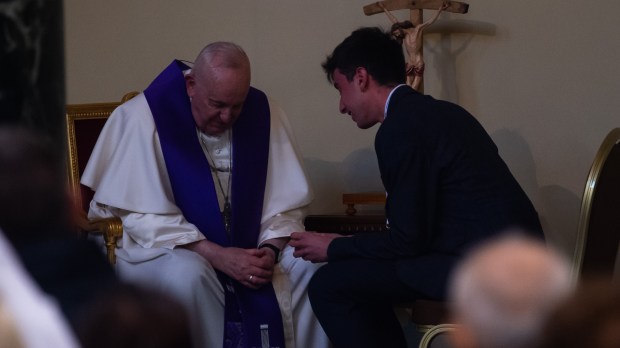“You must only think about forgiving,” Pope Francis told confessors at the Vatican on March 23, 2023. He emphasized that confessors should always be available to their faithful and warned them against acting as a “psychiatrist.”
“May there always be a penitentiary on duty. Always. Empty confessionals, never! ‘But,’ you could say, ‘the people don’t come!‘ Then read something, pray; but wait, they will come,” Francis said.
He urged a “constant presence of a confessor with an open schedule, in every pastoral zone.”
The Pope said this when he received a group of confessors who had participated in a Course on the Internal Forum, a program organized by the Apostolic Penitentiary which helps form those who impart the Sacrament of Confession.
In fact, the Pope called for a rediscovery of the importance of the Sacrament of Penance in the Church, especially in light of the Jubilee of 2025. He asked that local Churches’ pastoral programs give “a just space” to this sacrament, which “helps the lifeblood of mercy” circulate in the Church’s veins.
He outlined also that in a world filled with “hotspots of hatred and vengeance” confessors must “increase the ‘hotspots of mercy.’”
Francis insisted that “we are in a supernatural fight,” which is especially “virulent” in our time, but Christ’s victory is realized “each time a penitent is absolved.”
“Nothing distances from and defeats evil more than divine mercy.”
Don’t get into conversation with the devil or try to be a psychiatrist
Francis also told confessors to be wary of dialoguing with the devil or treating confession like a talk with a psychoanalyst or psychiatrist, outlining instead what the true mission of the sacrament of penance is.
“Jesus taught us that we should never dialogue with the devil. Never! He responded to the temptation in the desert with the Word of God, but he did not dialogue. […] One offers what is right for forgiveness and one opens some doors to help [the penitent] move on, but never act as a psychiatrist or psychoanalyst. Please, do not go into these things!” the Pope insisted, speaking spontaneously. “If any of you has this vocation [to mental health care], practice it elsewhere, but not in the tribunal of penance. This is a dialogue that is not convenient to have in the moment of mercy.”
The mission of the confessor, the Pontiff explained, is to “welcome everyone without prejudice, because only God knows what grace can work in hearts, at any moment.”
“Always look for the door to enter into forgiveness. And when you cannot enter through the door, enter through the window,” he added, suggesting for confessors to inspire at least the desire for repentance.
This desire for repentance, known as contrition, is, as the Catechism explains, a gift from God.
God always forgives
The head of the Catholic Church also asked confessors not to set conditions for forgiveness, because “God does not say, ‘Only this…’; he says, ‘Everything.’ […] He always forgives more, always!”
“If there is anyone who does not feel up to being a giver of the mercy received from Jesus, do not go to the confessional [to hear confessions],” the Bishop of Rome said.
He lamented for example the fact that a confessor in a papal basilica gave many reprimands and then gave an unfeasible penance. “This is no good. No. Mercy. You are there to forgive and to offer words so that the person can move forward, renewed by forgiveness,” he said.




